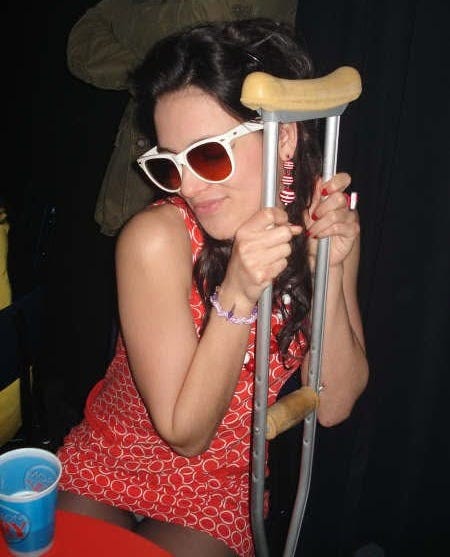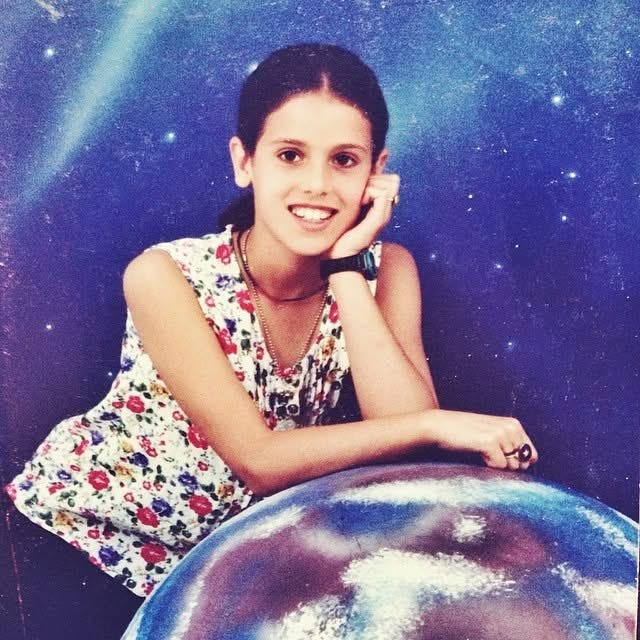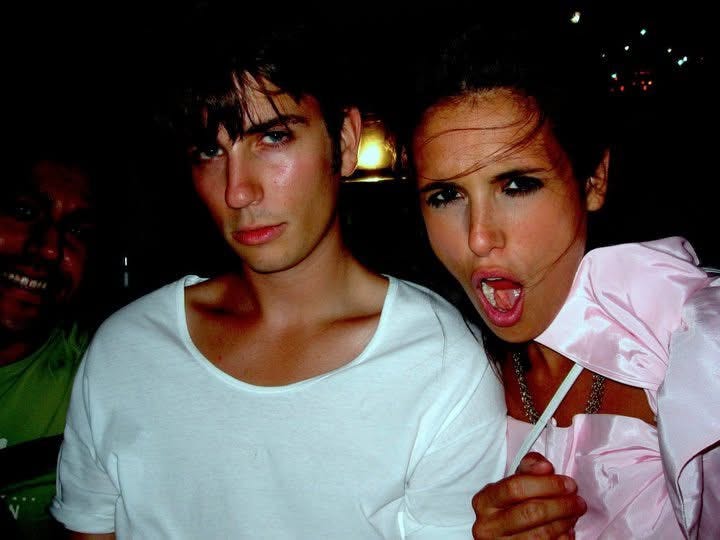We Stopped Clubbing, But We Need to Bring It Back
Millennials grew up on dance floors while Gen Z is growing up on their phones.
I know we’re in the middle of a constitutional crisis and that planes are flipping midair but there’s something on TikTok that I’ve been dying to talk to you about! Here’s the trend: Millennial women are posting cute class pictures of themselves in junior high, brimming with innocence, maybe wearing a butterfly clip or a GAP hoodie, before cutting to the song that was their favorite at the time.
And without fail, the song is pure filth.
"All my ladies pop your pussy like this."
"My neck, my back, lick my—"
"I wanna take a ride on your disco stick."
The contrast is comical, and the trend went viral for that very reason. We looked like actual children, but we were being raised by Pitbull, the Pussycat Dolls, and the deranged chaos of early 2000s club music. "Where were our parents?" one user commented.
Nowhere. Our parents did not care. Not in a neglectful way, but in a go-play-outside-and-figure-it-out way. We were unhinged. We made mistakes in real life, not just in the comments section. We got into cars with friends who had just gotten their licenses, showed up at malls with no cell phones and nothing but a vague “meet me at the food court in three hours” plan, and yes, we listened to wildly inappropriate music everywhere, on our discmans, our ipods if we were lucky, in the car, at school dances, everywhere!
As I reminisced and sent these TikToks to my friends, something hit me: Where has all the feral music gone? And where are people even supposed to listen to these songs now?
Then I realized. It’s not just the music that’s disappearing. It’s the club.
It’s not just that millennials have aged out of clubbing (our knees wouldn’t survive). It’s that the clubs themselves are vanishing.
Between March 2020 and December 2023, over 400 nightclubs shut down in the UK alone—a 31% drop in just three years. In the U.S., the trend is even bleaker. The bar and nightclub industry’s revenue growth has slowed dramatically over the last five years. Iconic clubs have shuttered, replaced by yoga studios, overpriced brunch spots, or, worst of all, nothing at all…just empty buildings where chaos used to thrive.
And it’s not just the pandemic. The cost of living crisis has turned clubbing from a weekly routine into a luxury. Drinks are $18. Covers are $40. Millennials, weighed down by student debt and the impossibility of homeownership, stopped going out as often. And Gen Z? Two-thirds of them haven’t even consumed alcohol in the last year. And as Derek Thompson wrote at The Atlantic, we’re just not hanging out anymore.
The effect? Less clubbing. Less chaos. Less human interaction that isn’t optimized for efficiency. Less of us gathering in the way humans are meant to, casually, spontaneously, without needing a text to schedule a call to schedule a calendar invite just to make it happen. Hanging out has become something to plan, not something that simply occurs. Without randomness, without chance, we lose something essential. We lose the accidental friendships, the unplanned nights, the serendipity that makes life feel expansive instead of contained. Socializing has become just another thing to optimize, another thing to do correctly, another thing to get right. And in the process, it’s started to feel less like life and more like work. Clubbing was never just about drinking. It was about randomness.
And I strongly believe the disappearance of clubs isn’t just some quirky nightlife trend. It’s a reflection of the changing way that we connect with each other and explains our youth’s dwindling mental health.
Because when you strip away the strobe lights, the watered-down vodka sodas, and the aggressively sweaty guy named Jason who won’t stop trying to dance with you, clubbing wasn’t just a social activity. It was a ritual.
No wonder one of the biggest catchphrases of the year was “in the club we’re all fam.” It wasn’t just a Broad City catchphrase from 2014, it was a promise. A declaration that, for a few hours, the outside world and its hierarchies dissolved. The pressures of work, the anxieties of identity, the expectations of who we were supposed to be, none of it mattered under the pulsing lights, the heavy beats and all that cigarette smoke.
Anthropologists might call it a liminal space, a temporary world separate from the everyday where normal rules of behavior were suspended. Psychologists might say it fostered collective effervescence, that euphoric feeling of being deeply connected to others in a shared experience. Neuroscientists could argue that the dopaminergic feedback loop of beat drops and synchronized movement heightened pleasure and created a sense of belonging.
The club was one of the last places where you could surrender to something bigger than yourself, where you could feel small in a good way, one body in a sea of moving bodies, your individual self momentarily dissolving into something communal. You didn’t have to curate, optimize, or perform; you just existed, sweaty and euphoric, yelling the lyrics to a song that everyone inexplicably knew at the same time.
And I know this because I went clubbing, a lot. I loved it. I loved the ridiculous drama of it all, the frantic texts to find someone at coat check, the way a song you weren’t even that into could feel like a spiritual experience at 2 a.m., the moments when the bathroom line became an impromptu therapy session. The best nights weren’t even about the club itself but about the in-between moments, the before and after, the way the night unfolded without a plan.
Clubbing was never just about drinking. It was about serendipity. It was about being pushed into the moment, about encountering people you would never meet otherwise, about friendships that would form and dissolve in a single night, about the transience of human connection in a way that was liberating, not terrifying. The club was the last place where you could fully exist in a crowd, where you could be surrounded by people and still feel anonymous, where you could belong without proving that you deserved to be there. There’s a spiritual case for clubbing.

But let’s be real, the club was also about sex.
We never said it outright, but everyone knew. You went clubbing to dance, yes. To be with your friends, yes. But also, you went to meet people. To make out with someone you’d never see again. To have a one-night stand that was fun but forgettable, or maybe meet the love of your life, or at least get over your ex, or get drunk enough to text your situationship (a relationship status that was so rare that it had no name yet) one letter at a time with your razor flip phone, which could be dropped from the third floor of a dance club and still be unbreakable.
In a way, clubbing was the last great in-person dating app, a space designed not for long-term compatibility but for chemistry, for chance, for the kind of attraction that can’t be distilled into a profile or an algorithm. And now, as clubs disappear, it’s no surprise that young people are having less sex.

You could also be dumb in the club.
You could make out with someone whose name you didn’t catch. You could dance with a stranger for five songs and never see them again. You could have a regrettable hookup that became a funny story, not a crisis. Clubbing gave you social deniability, whatever happened under the flashing lights existed only in that moment. It was ephemeral. Disposable. Safe in its meaninglessness.
But where can Gen Z be dumb?
Every interaction now has stakes. Dating requires a strategy. Texting requires a game plan. A phone call needs to be scheduled in advance. A bad date might not just be a bad date, it might be screenshotted, tweeted, turned into discourse. There is no privacy in trial and error anymore. Your mistakes aren’t temporary, they last forever.
The club was one of the last places where you could be messy without consequence. And without that space, is it any wonder that young people are retreating from each other? That dating has become a chore? That spontaneity has been replaced with preemptive regret?
People say Gen Z is risk-averse. But how can you take risks when the world is always watching? We’ve lost one of the core places to be unserious so of course the younger generation doesn’t know how to loosen up.
There’s a lot of talk about how to fix the Gen Z loneliness epidemic. The solutions always sound like punishments: less screen time, less scrolling, less tech.
But maybe the answer isn’t taking things away.
Maybe it’s bringing something back.
So yeah, millennials are cringe now. But at least we had clubbing. Millennials may be the butt of Gen Z's jokes, but perhaps their laughter masks a tinge of envy because we had our crazy youth and theirs was stolen from them. At least we sweated through a business casual zara blazer like it was body armor. At least we put our hands up in the air, like we truly, deeply, did not care, because back then, we actually didn’t.
And honestly?
Maybe it’s time to do it again.
How Do You Plan for a Future That Might Not Exist?
In a world that feels more uncertain every day, I promise to keep writing you dispatches even from the edge of the apocalypse. 🌍✨ Thank you for subscribing and being part of this space for connection, reflection, and hope amidst the chaos. 💌 Let’s navigate this together.











what’s your favorite clubbing memory
At 18 years old I was fully clubbing in nyc, armed with nothing but chutzpah and a fake ID. Sound factory, tunnel, Limelight, Exit. Tons of gay clubs too. Was it my “scene” in the end? No. Was I glad I did it? HELL YES. Where else can you drink cheap tequila sunrises and act a fool till 4 am, basically anonymously? Nowhere! Do it while you can! If I drank tequila sunrises until 4 am now I’d be DEAD! 💀